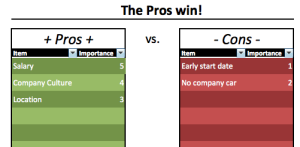There are many reasons why you would want to stay in touch with a prospective employer.
Say your internship ended this summer and you want to remain on their radar for another internship. Or, if you’re a senior, you want to keep the relationship with your boss to get strong consideration for a full-time position after you graduate.
Maybe you’ve never worked for the organization, but you love what you’ve found out about it and want your name fresh in the recruiter or hiring manager’s mind.
However, the process of staying in touch with a potential employer can be trapped with obstacles.
You don’t want to be annoyingly persistent, but you also want to get the point across that you’re extremely interested.
Tips To Professionally Stay In Touch
It’s important you recognize the dynamic behind these tips, which is you’re in the position of need and they’re in the position of power. So, you should make things as easy as possible on the person you want to stay in touch with.
The following tips will help you build professional relationships and stay in the employer’s mind:
1. Find the best channel of communication. If you’ve previously worked with a manager, hopefully you can gauge what’s the best channel to communicate. Maybe it’s through email, phone, LinkedIn, or Twitter. Maybe they would prefer to meet in person.
If it’s a semi-stranger you want to stay in touch with, email is probably the best option to start. Then you could talk about meeting in person, only if they first show interest in giving you feedback.
2. Be concise and to the point. Assume whoever you’re trying to contact is very busy. So, I would not send an email longer than five sentences.
Also, I wouldn’t ask to speak on the phone or meet in person for anytime longer than 30 minutes. You can be safe and ask to speak for 15 minutes in consideration of their schedule.
3. Develop a deeper relationship. Don’t be selfish in this communication by only asking when the next opening is and if they can help you. Update your previous boss about what’s going on in your life. Tell them something cool you’re doing in college.
Also, expand the relationship by showing interest in their life. Ask how work is going, see if you can help them in some way, and congratulate them if their company won an award. Little things like this can go a long way.
4. Reach out two to three times per year. Avoid overdoing this communication to the extent that it decreases your opportunities. Remember, these are usually busy people who are doing you a favor by staying in touch, not the other way around.
So, two to three updates is enough to get your interest across and keep the relationship healthy. If I were you, I would send an email to your previous boss in the fall and the spring. This worked well for me.
5. Don’t burn any bridges. Regardless of how low you were paid, the difficulty of the job, or the unreasonableness of your boss, don’t burn any bridges with the thought that you’ll never need this person again.
Because, you might need them and if the relationship is ruined then you’ve shot yourself in the foot. Plus, you never know when this person is going to show up again and what influence they may have over your career.
You Never Know What Networking Can Do
Staying in touch with your previous boss, a recruiter, or a hiring manager could lead to no results, which will feel like a waste of time.
Or, an employer will appreciate your interest in the position and extra effort, so they put your name at the top of their future interview list.
You simply don’t know what will happen from building and engaging your professional network.
What I do know is spending fifteen minutes typing an email for unknown results is a small risk, compared to the reward of getting a job because you stayed in touch.
You also never know what these connections will lead to in the future. Maybe your dream job?



